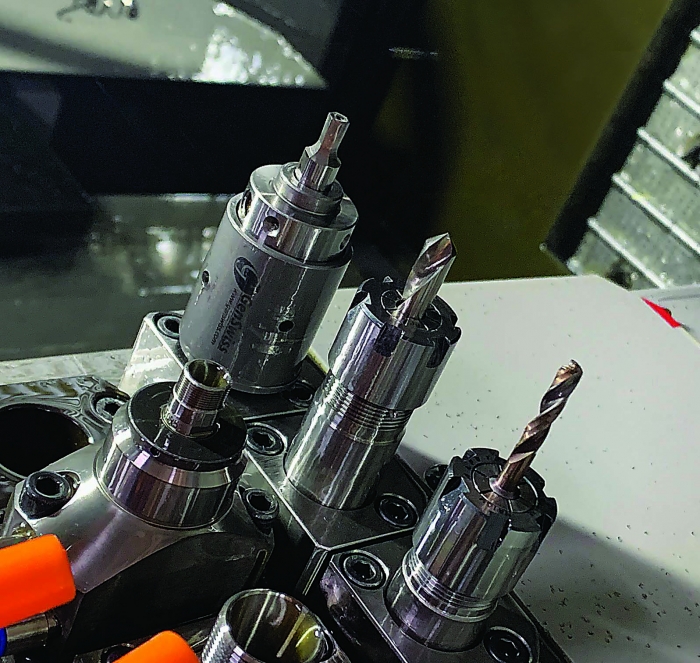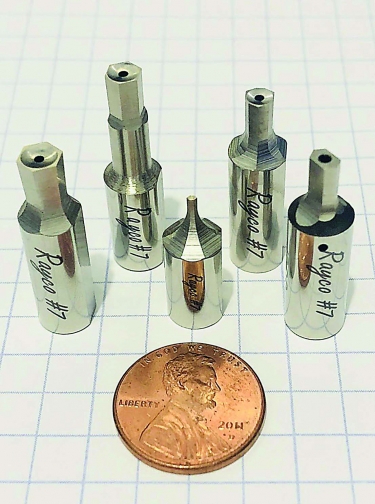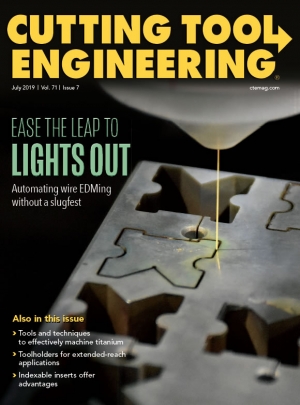A part manufacturer must have confidence in its cutting tools to successfully perform lights-out machining. “When we can’t trust a tool, we can’t do it, so we lose production,” said Ben Sacco, operation manager for Radax Industries Inc.
Unfortunately, the Webster, New York-based fastener manufacturer and provider of machining services didn’t have enough confidence in the rotary broaches it was applying to allow long, unattended production runs. For example, Radax averaged 500 pieces per broach, which cost $100 each, when machining 17-4 PH stainless steel before the tool would chip and need replacement, Sacco said.

A Rayco #7 rotary broach (left) set up on a machine at Radax Industries. Image courtesy of Radax Industries
“I just couldn’t swallow that cost much longer. It was getting ridiculous,” he said, noting that Radax doesn’t typically run low-volume jobs at its 50,000-sq.-ft. facility. “We have long, ongoing jobs that never come off the machine.”
Of course, reaching that level didn’t happen overnight. Sacco’s grandfather Rocco founded the company in 1967, operating three Davenport screw machines in a rented barn in rural upstate New York. The “office” was a pay phone in a bar across the street, Sacco said. “The bartender would run across the street when the phone started ringing and say, ‘Hey, Rock, you’ve got a phone call.’”
With Radax doing more business than ever in the present day, it couldn’t afford to have a weak machining link, Sacco said. He previously found that a rotary broach that lasted for 500 pieces when cutting 17-4 PH stainless, which tends to workharden and dull edges, was the best available. Then, he learned about the rotary broaches from Rayco Tools Inc., Warsaw, Indiana. Sacco read testimonials about Rayco’s broaches on LinkedIn and contacted Chris Rooney, the toolmaker’s owner and president, who sent three free broaches to test. Of those, Rayco #7 proved most
effective, Sacco said, and Radax immediately ordered more.

Rayco #7 rotary broaches are for broaching materials with tensile strengths exceeding 190 ksi and a hardness up to 50 HRC, including cobalt-chrome, strain-hardened 316 stainless, titanium, Inconel and Monel. Image courtesy of Rayco Tools
Rooney stated that Rayco #7 is made of a special-purpose HSS that exhibits high hardness, enhanced abrasion resistance and toughness. The broach is suitable for machining materials with tensile strengths exceeding 190 ksi and a hardness up to 50 HRC. But he emphasized that having a source for the substrate won’t enable another toolmaker to duplicate the performance of Rayco broaches.
“It’s not the HSS material but the Rayco heat-treat process that makes all the difference,” Rooney noted. “Our process creates a finer grain structure at a higher hardness while maintaining the toughness. Conventional heat-treated HSS creates this fine structure but at a lower hardness, therefore lacking the wear resistance compared to a Rayco heat-treated broach.”
Although Sacco has broached up to 1,800 parts made of 17-4 PH stainless with a Rayco #7, he normally replaces the broach after the counter on the control of a Tsugami Swiss-style machine reaches 1,000 pieces. “We know if we pull it out at that time, there is virtually no cause for failure, and we just keep running,” he said. “That way, we have zero defects.”
That point isn’t the end of a tool’s life, however. Radax refaces used broaches and applies them when workers are present at a machine, Sacco said. “The tool life is almost the same, but I don’t want to push it.”
In addition to lasting twice as long as the previous rotary broach, Sacco said Rayco #7 broaches cost 25% less. “These #7 tools give us the ability to run longer production runs overnight without having to worry about a heap of scrap in the morning. We had no confidence before—zero.”
He said Radax also applies the broach to machine a variety of other metals, including titanium and S-7, 15-5 and 316 stainless. “I’ve switched all our broaches to Rayco.”
Contact Details
Related Glossary Terms
- broach
broach
Tapered tool, with a series of teeth of increasing length, that is pushed or pulled into a workpiece, successively removing small amounts of metal to enlarge a hole, slot or other opening to final size.
- broaching
broaching
Operation in which a cutter progressively enlarges a slot or hole or shapes a workpiece exterior. Low teeth start the cut, intermediate teeth remove the majority of the material and high teeth finish the task. Broaching can be a one-step operation, as opposed to milling and slotting, which require repeated passes. Typically, however, broaching also involves multiple passes.
- hardness
hardness
Hardness is a measure of the resistance of a material to surface indentation or abrasion. There is no absolute scale for hardness. In order to express hardness quantitatively, each type of test has its own scale, which defines hardness. Indentation hardness obtained through static methods is measured by Brinell, Rockwell, Vickers and Knoop tests. Hardness without indentation is measured by a dynamic method, known as the Scleroscope test.
- high-speed steels ( HSS)
high-speed steels ( HSS)
Available in two major types: tungsten high-speed steels (designated by letter T having tungsten as the principal alloying element) and molybdenum high-speed steels (designated by letter M having molybdenum as the principal alloying element). The type T high-speed steels containing cobalt have higher wear resistance and greater red (hot) hardness, withstanding cutting temperature up to 1,100º F (590º C). The type T steels are used to fabricate metalcutting tools (milling cutters, drills, reamers and taps), woodworking tools, various types of punches and dies, ball and roller bearings. The type M steels are used for cutting tools and various types of dies.
- wear resistance
wear resistance
Ability of the tool to withstand stresses that cause it to wear during cutting; an attribute linked to alloy composition, base material, thermal conditions, type of tooling and operation and other variables.
End User
Radax Industries Inc., 877-211-5210, www.radax.com
Solution Provider
Rayco Tools Inc., 574-267-0080, www.raycotoolsinc.com
Challenge
Extend rotary broach tool life to enable lights-out machining.
Solution
A rotary broach that consistently lasts for at least 1,000 parts.








